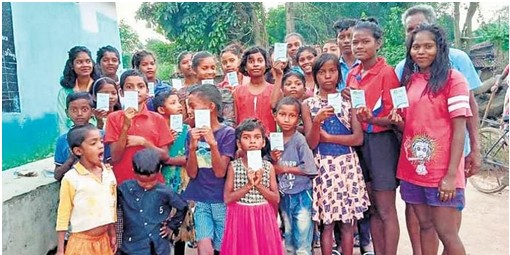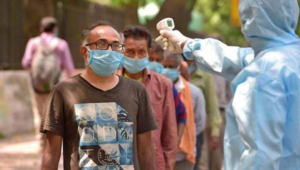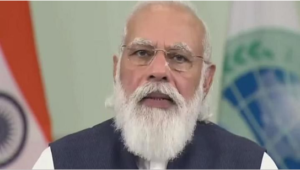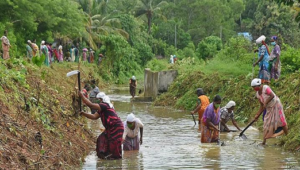
The News Editorial Analysis 6th November 2021
Bal Vikas Khazana: This Ranchi kids’ bank imparts democratic values
Chandan Singh, founder member of Pratigya Trust, which launched the bank, informed that Bal Vikas Khazana aims to impart democratic values, social education and life-skills.

Children part of Bal Vikas Khazana show their account cards.
RANCHI: A bank catering to children – Bal Vikas Khazana – has began functioning in the slums of Ranchi and Khunti. With over 600 account holders to its credit all between 8-18 years of age, and run by the children themselves, Khazana aims to teach democratic values, develop spending and saving prudency in kids.
Chandan Singh, founder member of Pratigya Trust, which launched the bank, informed that Bal Vikas Khazana aims to impart democratic values, social education and life-skills (social-emotional-ethical learning).
“Our goal goes along the lines of WHO guidelines, which includes financial education among 10 different trades,” said Singh.
Kids who were earlier plagued by substance are account holders with Khazana now.
Muskan Kumari, Class VIII student from Jagannathpur said she has been elected as Assistant Child Volunteer Manager (ACVM) by the children and has been supporting the Child Volunteer Manager (CVM) in maintaining the ledger and cash book.
CVM Anjali Kumari said the children have to mention the source from where they received the money when the deposit or withdrawal goes beyond Rs 200 children have to give an application citing reasons for the transaction.
“Children also get 10 per cent interest per annum on their deposits, and may get interest free advance (loan) for education purposes or even starting a business on their own,” said Anjali.
US Congress passes Joe Biden’s USD 1.2 trillion infrastructure package.
The $1.2 trillion transport and broadband internet upgrade — one of the largest shopping sprees in US history that passed the Senate months ago — was rubber-stamped by the House.
The US Congress delivered embattled President Joe Biden a huge victory Friday as it passed his historic infrastructure investment package.
The $1.2 trillion transport and broadband internet upgrade — one of the largest shopping sprees in US history that passed the Senate months ago — was rubber-stamped by the House with a comfortable majority after more than a dozen Republicans joined Democrats to back the bill.
The big package would provide large numbers of Americans with assistance to pay for health care, raising children and caring for elderly people at home.
Navy chiefs of 12 nations from Indian Ocean Region to participate in Indian Navy’s maritime conclave.
The participating Navy chiefs and heads of maritime forces will also dwell upon the significance of interoperability to effectively deal with maritime security challenges in the Indian Ocean region.

Navy Chiefs of 12 countries from the Indian Ocean Region will participate in the Indian Navy’s three-day-long maritime conclave starting on Sunday in Goa, according to an official statement.
This will be the third edition of the Goa Maritime Conclave (GMC-21).
It will build upon the working level deliberations of the Goa Maritime Symposium-21 held in May this year, the Indian Navy’s statement mentioned.
The theme for GMC-21 is ‘Maritime security and emerging non-traditional threats: A case for a proactive role for IOR navies’, derived keeping in mind the necessity of ‘winning everyday peace’ in the maritime domain, it said.
Goa Maritime Symposium-21 was the Sherpa event for the GMC-21, the statement noted.
“At the GMC-21, Indian Navy Chief Admiral Karambir Singh would be hosting Chiefs of navies or Heads of maritime forces from 12 Indian Ocean littorals, including Bangladesh, Comoros, Indonesia, Madagascar, Malaysia, the Maldives, Mauritius, Myanmar, Seychelles, Singapore, Sri Lanka and Thailand,” it mentioned.
The participating Navy chiefs and heads of maritime forces will also dwell upon the significance of interoperability to effectively deal with emerging and future maritime security challenges in the Indian Ocean Region, it mentioned.
Defence Secretary Ajay Kumar and Foreign Secretary Harsh Vardhan Shringla will deliver the conclave address and the keynote address of the GMC-21.
The Indian Ocean Region has become the focus of the 21st-century strategic landscape and the GMC aims to bring together regional stakeholders and deliberate on the collaborative implementation strategies, the statement said.
“As part of the conclave, visitors would also be afforded an opportunity to witness India’s indigenous shipbuilding industry at the ‘Make in India Exhibition’ and the capabilities of Deep Submergence Rescue Vessel for submarines at the Marmugao Port Trust, Goa,” it said
Finance Ministry invites suggestions on taxation from industry and trade bodies.
Currently, more than 100 exemptions and deductions of different nature are provided in the Income-Tax Act.
The Finance Ministry has asked for suggestions on taxation from industries and trade bodies for Budget 2022-23, which is going to set the tone for growth of India’s economy hit by the COVID-19 pandemic.
In a communication to trade and industry associations, the ministry invited suggestions for changes in the duty structure, rates, and broadening of tax base on both direct and indirect taxes giving economic justification for the same.
Suggestions may be sent to the ministry by November 15, 2021, it said.
“Your suggestions and views may be supplemented and justified by relevant statistical information about production, prices, revenue implication of the changes suggested and any other information to support your proposal,” it said.
The request for correction of inverted duty structure, if any for a commodity, should necessarily be supported by value addition at each stage of manufacturing of the commodity, it said.
It would not be feasible to examine suggestions that are either not clearly explained or which are not supported by adequate justification or statistics, it said.
The Budget 2022-23 is expected to be presented in Parliament on February 1 next year.
It will be the fourth budget of the Modi 2.0 government and Finance Minister Nirmala Sitharaman.
The budget for the next year is expected to address critical issues of demand generation, job creation and putting the economy on a sustained 8 per cent plus growth path.
“As can be seen that the government policy with reference to direct taxes in the medium term is to phase out tax incentives, deduction and exemptions while simultaneously rationalising the rates of tax,” the letter said.
Currently, more than 100 exemptions and deductions of different nature are provided in the Income-Tax Act.The ministry also asked for suggestions on reducing compliances, providing tax certainty, and reducing litigations.However, it has clarified that goods and services (GST) matters are not examined as part of the budget, as they are to be decided by the GST Council.
Recommendation related with the Central Excise and Custom Duty could be given, it said.
Telangana High Court refuses to interfere in GO on retirement age.
The First Pay Revision Commission of TS in its report on December 31 last year made a similar recommendation.
The Telangana High Court on Friday refused to interfere in the implementation of the GO issued by the State government, increasing the superannuation age of the employees from 58 years to 61 years with effect from March 31, 2021.
A division bench headed by Chief Justice SC Sharma dismissed a batch petitions filed by Y Srinivasa Rao and several others seeking implementation of the GO with retrospective effect.Petitioners contended that ahead of 2018 Assembly polls, the ruling TRS assured the employees that the retirement age would be increased to 61 years. The First Pay Revision Commission of TS in its report on December 31 last year made a similar recommendation.
Emergency use authorization request filed with FDA for paediatric use of Bharat Biotech’s Covaxin.
The submission is based on the results of a Phase 2/3 paediatric clinical trial conducted by Bharat Biotech in India with 526 children 2-18 years of age.
Ocugen Inc., Bharat Biotech’s partner for USA and Canada for COVID-19 vaccine Covaxin on Friday, November 5, 2021, said it has submitted a request to the U.S. Food and Drug Administration (FDA) for Emergency Use Authorization (EUA) of the jab for paediatric use.
The submission is based on results of a Phase 2/3 paediatric clinical trial conducted by Bharat Biotech in India with 526 children 2-18 years of age, which bridged immunogenicity data to a large, Phase 3 safety and efficacy clinical trial in nearly 25,800 adults in India, Ocugen said in a regulatory filing.
“Filing for Emergency Use Authorization in the U.S. for paediatric use is a significant step toward our hope to make our vaccine candidate available here and help combat the COVID-19 pandemic,” Shankar Musunuri, Chairman of the Board, Chief Executive Officer and Co-Founder of Ocugen said.
Some research suggests that people are seeking more choices when selecting a vaccine, especially for their children.
Having a new type of vaccine available will enable people to discuss with their child’s physician the best approach for them to lower their child’s risk of contracting COVID-19, he further said.
“The inactivated virus platform has been used for decades in vaccines for the paediatric population and, if authorized, we hope to offer another vaccine option to protect children as young as two years,” he added.
A Phase 2/3, open-label, multi-center study was conducted in India from May 2021 to July 2021 to evaluate the safety, reactogenicity and immunogenicity of the whole-virion inactivated Vaccine in healthy volunteers in the 2-18 age group.
Covaxin was evaluated in three age groups: 2-6 years, 6-12 years and 12-18 years.All participants received two doses of the vaccine 28 days apart, it said.
Covaxin was recently awarded Emergency Use Listing by the World Health Organization.
IMF welcomes India’s announcement at COP26 on renewables, net-zero target by 2070.
At the COP26 summit in Glasgow, Prime Minister Narendra Modi made significant announcements, including the bold pledge of India becoming net-zero by 2070.
India’s Prime Minister Narendra Modi attends the opening ceremony of the UN Climate Change Conference COP26 in Glasgow, Scotland. (Photo | AP)
The IMF has welcomed India’s announcement at the COP26 summit on new targets to increase reliance on renewables and reduce the carbon intensity of its economy, including to adopt a net zero target by 2070.
Gerry Rice, Director, Communication Department at the International Monetary Fund (IMF), said India’s actions may help catalyse action in other emerging economies as well in addressing the climate change challenges.
“We welcome India’s announcement at the COP26 of new targets to increase reliance on renewables and reduce the carbon intensity of its economy, including to adopt a net-zero target by 2070,” Rice told reporters at a news conference on Thursday.
“As you know, India is currently one of the world’s largest emitters, still heavily reliant on coal for electricity generation. India’s significant investment in renewables and climate change adaptation policies suggests it is well-positioned to take further steps to reach this new target,” Rice said responding to a question.
“We are heartened by India’s focus on achieving progress in the current decade given the urgent need for global mitigation action. And as with other countries, it will be important to follow through with specific actions to contain emissions over the current decade,” he added.
At the COP26 summit in Glasgow, Prime Minister Narendra Modi made significant announcements, including the bold pledge of India becoming net-zero by 2070.
Besides the net-zero target, Modi also raised India’s Nationally Determined Contributions (NDCs) of achieving 450 giga watt non-fossil energy capacity to 500 giga watt by 2030.
“India will increase its non-fossil energy capacity to 500 giga watt by 2030; India will fulfil 50 per cent of its energy requirements from renewable energy sources by 2030. Between now and 2030, India will reduce its total projected carbon emissions by 1 billion tonnes and by 2030.”
“India will reduce the carbon intensity of its economy by 45 percent and achieve the target of net zero by 2070,” the prime minister said, adding that these five elixirs will be an unprecedented contribution by India towards climate action.
He also asserted that India is the only country that is delivering in “letter and spirit” the commitments on tackling climate change under the Paris Agreement.












